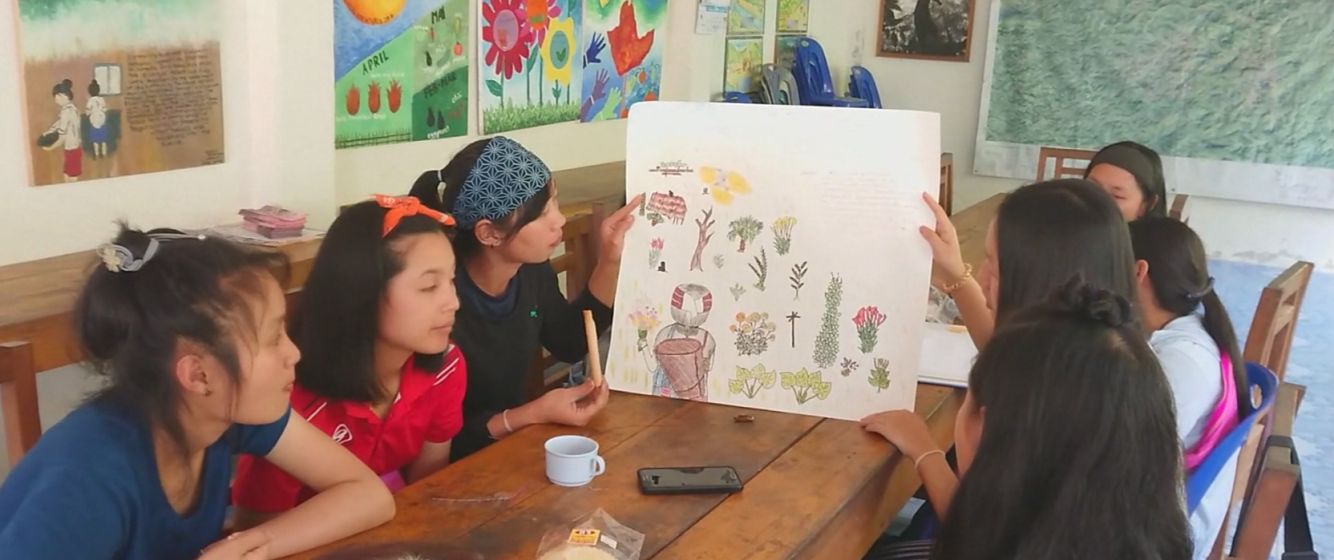
After the Harvest: The Koh Toh To Ceremony of the Karen in Huay Hin Lad Nai, Thailand
This report from the fields of Huay Hin Lad Nai comes from the research team at the Centre for Ethnic Studies and Development, Chiang Mai University, Thailand, as part of the project Living in and with the Forest in Northern Thailand. Members of the Karen youth community discuss the Koh Toh To ceremony, which signals the end of the harvest season among the Karen of Huay Hin Lad Nai.
By Siya Uthai
“Tho-B-Kha Pee-B-Syor Ma-Tha-Wee Tha-Tae-Lee
Or-Ser-Kor-Me Or-Ser-Kor-Kue Ko-Noi-Klee
Pa-Ner-Kue Ko-Noi-Klee Ter-Pu-Jer-Nor-Ja Or-Ter-Pu
Dya-Jer Ker-Su-Te Su Yapa-Kor
Ner-Me-Ke Su-Mu-Ko Sey-Ker-Cher Me-Le-Su Hae-Lor-O-Wa Dor
Kwa-Shaw-Bue-Kee Tha-Zu-Tha-Pla-Klee Pa-Ke-Tae-Lor Por-Bor Por-Kor
Suyie Ner-Ber-Kwa-Nor-Klae Ler-Por-Bor Por-Kor Ther-P-Ya-E
Thue-Tha-Dor Thue-Le-Pa-Ke Kri-Tor-Kae-Na Khor-Ti-Ko Ther-Ker-Kor Sor-Bae-De”
The text above is a Karen chant for ‘Koh Toh To’, the ceremony signalling the end of harvest and leaving the rice field. It narrates the tale of ‘Tho-B-Kha Pee-B-Syor’, the guardian spirit of the rice field, “Tho-B-Kha Pee-B-Syor, I now finished my work on the rice field, please come to eat rice and taro together. I collected a part of them for you and another part for planting next year. If Tho-B-Kha Pee-B-Syor returns to heaven, please come back again next year to help me in protecting all plants in the field. I will place red and yellow flowers as a sign along the way to my home. When I am at home, I will put bouquets of red and yellow flowers at the door of my home so Tho-B-Kha Pee-B-Syor can notice that this home is already finished in harvest season.”
The harvest season starts from late October to early November each year. This year, the rice field of Mr. Thi Pu-Krae was the first of our village to start harvesting. Villagers came together at Mr. Thi’s field to support him in harvesting. Many people came to help him, and so the harvesting was completed quickly in the early afternoon. Cucumbers were found in the rice field, which is regarded as a sign of luck, and will be eaten by the one who found and friends nearby. This year, villagers worked to compete against the rain because the rice cereal cannot be extracted from its spike by threshing if the paddy is wet. After harvesting, the rice needed to be kept drying for approximately 3 days before threshing. Different varieties of rice have different beats of threshing. Some varieties require a little stick to pull it out.
When speaking of rice ceremonies, the Karen youth members also added the ceremony before rice flowers bloom during August. The ‘Bwor-Khee’ ceremony involves three chickens and 4 sub-rituals. In late October, the blooming rice covers all the fields with golden rice spikes waiting for the harvest season. During the harvest, the rice field owner will be the first to start cutting rice to signal the beginning of the harvest ceremony. Later, everyone can cut the rice by starting from the area near a ritual cottage. However, if the rice field owner feels that the harvest ceremony cannot be done in one day, the rice within a ritual square will not be harvested until the whole rice field is done. Then the rice from the ritual square will be cut and attached to the ceiling of the ritual cottage along with one egg.
The eating new rice ceremony is a family ritual. At that time, family members have to find moles or any similar animals that live in the soil of the family’s rice field to eat with the new rice in the ceremony. Moreover, all kinds of vegetables in the rice field and a couple of freshwater crabs (male and female) are included. Before family members start eating in the ceremony, they have to put all prepared food at the stove to allow the guardian spirits at the stove to eat them first, followed by the father and mother, before everyone starts eating. This ceremony takes place on the day when all family members come together. Rice from all the places that belong to the family will be collected and cooked together.
Siya Uthai